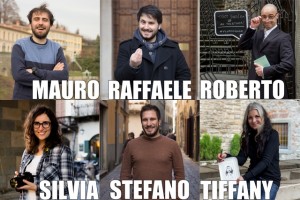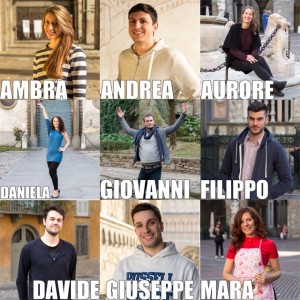Organising an Agora is a huge effort in terms of human resources, time, but also economy. Hosting and feeding more than 1000 participants can be challenging and AEGEE-Bergamo found a way to raise some funds, especially for their helpers. We asked some questions to Silvia Cannarozzi from the PR team of the Agora.
 The AEGEEan: Why did you decide to create the crowdfunding campaign?
The AEGEEan: Why did you decide to create the crowdfunding campaign?
Silvia: Organising an Agora, especially at the very beginning, when you face the budgeting phase, can be quite scary. Bergamo is placed in one of the most expensive regions of the continent, having the effect of a relevant increase of cost compared to all other recent Agora. So, as we always do in AEGEE-Bergamo, we tried to find various and creative ways to sustain the whole project. Crowdfunding came us in mind in an early stage of the project. It sounded a really interesting way to mix FR and PR and to get in connection with our community.
What is the goal? Since you decided for a platform that returns all the money in case the goal will not be reached, what you are going to do if you don’t reach it?
The goal is 3500 euros. It’s just a drop in the sea of the expenses we are facing, but for us it’s more valuable because it’s a great proof of closeness and support from our network. What we are going to do if we don’t reach it? We will embrace the failure and learn how to do better next time.
What will the money be used for?
The money will be used to cover part of the expenses of the meals for all the over 100 organisers and helpers which will donate fully their time and energies during the the event.
What are the rewards for those who are donating?
We wanted to do something more than the usual merchandise. If we’ve expected people to believe in us and support the campaign, we have to show them our commitment.
So we put ourselves on the plate proposing unique activities that were peculiar of each organizer. For example: as backer, you can choose between a wine tasting experience with Filippo Consoni or a portrait by Tiffany Pesenti. Having a romantic dinner with AEGEE-Bergamo president Davide Viero or choosing the profile picture of the main organiser Paolo Ghisleni during the Agora. More “serious” rewards: there’s the chance to get a booth in the AEGEE-Fair ((just for AEGEE antennaes or non-profit organisations) or one hour of consulting on many subjects with the most proficient members of AEGEE-Bergamo.
What is the target?
During our researches on the ingredients of a successful crowdfunding campaign, we discovered that most of the backers are primarily the people you know (friends, family) and secondarily, the network you belong to. They are called the 1st and 2nd circle of supporters. There’s also a third circle made of perfect strangers, but they are very difficult to reach, especially in a project like Agora. You’ll may be surprised to know that a lot of AEGEE-Bergamo organisers have already donated to the campaign. That shows how much passion and caring they are putting in it. That’s the target.
Agora fee is 55 euros and the statutory will last one day less than the previous Spring Agora, do you think it’s fair to ask more money to AEGEEans and Agora participants?
 Sadly, the fees cover just a small part of the entire budget of the Agora. But crowdfunding isn’t about money, it’s about community. People don’t donate to a crowdfunding campaign to gain a gadget, they donate to support an idea they believe in.
Sadly, the fees cover just a small part of the entire budget of the Agora. But crowdfunding isn’t about money, it’s about community. People don’t donate to a crowdfunding campaign to gain a gadget, they donate to support an idea they believe in.
We, as AEGEEans, have the great advantage of being part of a huge international network that’s a unique value to which the campaign is addressed. We wanted AEGEEans to connect with us and feel part of the organisation even before the Agora kicks off. We wanted the network to feel involved in part of the responsibilities that comes from a big event like this.
If the crowdfunding campaign succeeds, it will be a win not just to AEGEE-Bergamo and Agora, but for the whole network to prove that we are strong and willing to help each other. And that’s what matters to us most.
Written by Erika Bettin, AEGEE-Verona

